12-18 April, 2009
In Thailand, red-shirted citizens take to the streets to fight the country’s unelected Premier and demand democracy. In sleepy Hong Kong, we sit back and nod as we read that the contest to be the next Beijing-appointed Chief Executive has begun.
The mood on the Mid-Levels Escalator this morning is one of relief tempered by mild foreboding, as commuters digest the weekend reports that senior Executive Council member Leung Chun-ying will officially declare his interest in the top job at some stage (according to the usual, well-placed anonymous source). It is hardly news. Leung’s ambitions can be traced back to the 1980s, when the up-and-coming surveyor was among the avant-garde of businessmen publicly identifying with Beijing. He sat on China’s pre-1997 preparatory bodies, served as an advisor to the Big Lychee’s first Chief Executive Tung Chee-hwa and makes all the right United Front noises at all the right times.
To thoughtful but pragmatic minds, CY Leung could actually be a figure of hope. This might sound like a strange thing to say about someone with the severe, sinister, half-Romanian demeanour that prompts nightmares in sensitive children. But it is a question of what alternatives there are. We are desperate.
Chief Secretary Henry Tang has often been considered the most likely contender to follow Donald Tsang in 2012. But we have already been run by a tycoon who inherited immense wealth from his Shanghainese daddy. It was such a disaster Beijing had to fire him and install the Brits’ running dog Sir Bow-Tie. Henry felt he was owed the job then, and has never quite recovered from the humiliation. Sorry, Henry.
The other main possibility is Tsang II – Financial Secretary John – as Donald’s hand-picked successor to perpetuate rule by bureaucrats. But this is little more appealing than the idea of giving the job to a son of the tycoon caste. John is a smug zombie-administrator who thinks visionary policymaking consists of idiotic schemes to turn Hong Kong into a wine hub and an Islamic banking hub and now has to live down a recent series of financial-sector mishaps against the backdrop of the Great Crash of 2009.
Leung is a tycoon, but a self-made one and locally born (albeit with Shandong roots). If you can judge a man by his enemies, he has impressive credentials – the property developers loathe him for urging Tofu-for-Brains to flood the market with affordable apartments in the late 1990s, and the civil servants suspect that he disparaged Sir Bow-Tie’s fitness to lead when Tung was sinking.
There is a concern, however. The lucky winner of the race to be next Chief Executive will be decided by the Politburo in Beijing. Leung, as an early Tung ally, was closer to the last generation of national leadership. Most of all, the comrades up there take a dim view of people who show too much eagerness in wanting the job. CY would be well advised to note the fate of Peter Woo, jackbooted scion-by-marriage of the Wharf Holdings/Wheelock empire, who has clamoured for the local throne repeatedly since the 1990s. He was, perhaps, easily deluded – imagining that chairmanship of the HK Trade Development Council was an impressive power base in this day and age (the lady who is about to join is, I am reliably informed, the same Jennifer as Woo’s Lane Crawford-running daughter). Woo had to come to terms with the awful fact that, for all his efforts, it wasn’t going to happen. Or at least we hope he did – if drab, ghost-written op-ed pieces from him start appearing in the papers again, we will know he has still not taken the hint.
CY Leung is still playing it cool, burnishing his man-of-the-people image by pushing a minimum wage and thus adding local employers to the list of people who hate him. He knows that – bizarrely, and Beijing will never admit it – thanks to CH Tung no less, the masses in Hong Kong do have a sort of de facto veto. Unlike their counterparts in Bangkok.
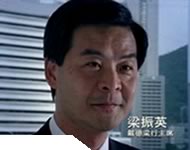
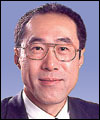
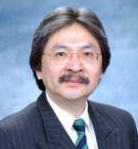
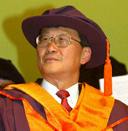
What is the most heart-warming, cheering and sweetest news story today? Could it be the promising work on a therapeutic vaccine for prostate cancer? No. Could it be Willy the heroic parrot, who squawked to save the life of his owner’s otherwise unattended choking baby? No. Could it be the creepy Japanese human-looking-robot-that-shows-real-emotions-and-helps-the-elderly du jour? No. Could it be the devaluation of the Singapore Dollar following a 20% annualized drop in the city-state’s GDP in the first quarter of 2009? Yes it could!
Responsible, hard-working, industrious, financially temperate export-dependent economies are going through Hell. Instead of the usual seasonal dips, Korea and Taiwan saw several years’ growth in overseas sales wiped out at end-2008. Taiwan’s exports fell 44% in the year to January. Japan and Germany are both looking at 6-7% falls in GDP this year (8-9% in the plucky little Lion City).
Meanwhile, the fiscally licentious, over-borrowing, infantile profligates of the Anglo-Saxon world are gradually picking their way out of the financial swamp their greed and lack of self-discipline created. The markets have let their currencies plummet, leaving them to reap the benefits of two delicious ironies. First, they suddenly become competitive manufacturers, able to make their own products rather than buy from foreigners, thank you, and maybe even in a position to find customers overseas. Second, they can inflate debt away. The US and UK look set to recover sooner and with shallower downturns (2009 GDP falls of 3-4%) than many other developed economies.
This is the end of an era. Everyone faces lean pickings for this year and next, and the sort of boom we took for granted at times in the last couple of decades may never happen again. Yet there is a curious kind of justice at work here. The dissolute Anglo sinners who gorged on indebtedness, fast returns and instant gratification will dust themselves off and at least have nice homes, huge flat-screen TVs and home movies of exotic vacations to show for it. The conscientious, diligent, self-sacrificing Teutonic and Nipponese saints will be stuck with industrial parks full of empty factories and harbours full of rusting container ships. It couldn’t happen to – did anyone mention ‘karma’? – a nicer bunch of people.
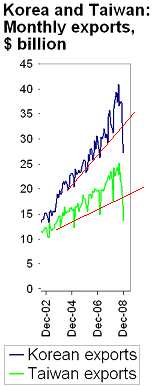
What’s in the South China Morning Post today? Who knows? Who cares? No right-thinking person is going to get around to reading the 16 April 2009 edition of Hong Kong’s leading English-language newspaper when he also has the Standard, whose front page alone bombards us with no fewer than five irresistibly juicy stories appealing to the tabloid prurience and sanctimoniousness that lies within every base and hypocritical one of us.
A Government arithmetical error means that promised cuts in bus fares will not in fact happen. To connoisseurs of civil servants’ mistakes, this has the makings of a minor classic. Hell hath no fury like the working-class Hongkonger who did not get the discount that was advertised. The Standard’s sister daily Sing Tao has this as its lead story, but officials will be relieved that – as we shall see – a multitude of other horrors are currently diverting the public’s attention.
For example, a spurned lover decapitates his belle because, it says, he couldn’t cope with her decision to end the relationship. He stuffed the remains in a Hello Kitty doll and then went to eat noodles. Perhaps – they usually do. I will get around to reading the whole article when I can, but so riveting is the Standard today that it is competing with itself.
A maid puts menstrual blood in her employer’s dinner. It was cooked, at least. A good source of iron, and free, but it seems that even Cantonese cuisine has its limits. Live monkey brains. Deer penis. Placenta soup. And there we draw the line. Now we know.
Last but not least – it is in fact the main story – the Consumer Council finds evidence that supermarket duopoly Park N Shop and Wellcome are, in collusion, hiking prices of particular goods before reducing them by a smaller amount and proclaiming magnificent price cuts. In most developed economies, the senior executives responsible would be in jail. In the Big Lychee, a corporate communication flunky is sentenced to the issuing of a statement saying how the company is committed to giving customers best value for money.
The media and pro-democrat politicians jumping on this bandwagon could point out that property developers like Li Ka-shing’s Hutchison (owner of Park N Shop) legally advertise apartments as being 25% or so bigger than they really are – adding stairwells, hallways and other exterior space to the area, so a 600-sq-ft flat going at HK$3,750 per sq ft is actually a 450-sq-ft flat going at HK$5,000 per sq ft. But they don’t. They could also stress that this criminal-anywhere-else state of affairs exists purely because the Hong Kong Government, under the stewardship of dazzlingly effective and capable administrator and visionary Sir Donald Tsang, lets it. They don’t mention that either. The newspapers fear an advertising boycott. The politicians are dim.
UPDATE… A phone call from Police Inspector and old friend Morris, Scotland’s finest contribution to local law enforcement since the days when Jardine’s (owners of Wellcome – small world!) were beheading pirates down at Repulse Bay. The Fire Services Department have just released a Mr Cheng who had been trapped in an elevator in Kowloon Bay for four hours. After gnawing several of his own fingers off, he had apparently started to read a copy of the SCMP. I stand corrected. Morris says he will get a quick summary from the guy.
Sitting in the gwailo’s lair on the top floor of S-Meg Tower, in the not-quite-as-bustling-as-it-used-to-be heart of Asia’s leading international business centre, I look through the local news to see that Mainland authorities are apparently relieved that pro-democrat Cardinal Joseph Chan – spelt ‘Zen’ for some reason – is handing over to a less turbulent priest. At least, that’s the theory. On his first day on the job as the head of Hong Kong’s Catholics, John Tong calls on China’s leaders to recognize the victims of the 1989 Beijing massacre as righteous rather than counter-revolutionary. Presumably, the Central People’s Government realizes that there are limits to just how communist-friendly a senior Holy Roman is going to be, but it is always tempting to see what we want to see.
A shout from outside my door summons me to the side of the Big Boss, who drags me across to the main meeting room, in which a special visitor awaits.
“It’s Sinchin Linpitchoonikul’s son,” he whispers before knocking on the door, entering and greeting the mid-20s, casually dressed offspring of a very wealthy tycoon with whom the company could, in theory, do business one day. Our avuncular Chairman shakes hands and addresses the scion as Larry, after which I perform a quick, friendly wai and call him Khun Sinchin – which earns me an anxious glance from the Big Boss, wondering which one of us might have made a shoe-shining faux pas. The young man seems happy either way and conveys inflated greetings from his father.
To me, the Overseas Chinese are a constant. Travel around Southeast Asia and you find kingdoms, republics, places where Muslims slaughter goats, where Buddhists give alms to monks, where Catholics nail each other to crosses, where capitalists exploit, where communists oppress, where head-shrinking savages lurk in jungles and where heavy metal fans ride big motorbikes. But look around, and wherever you go you will always find a side street with a pair of kids in plastic sandals playing badminton outside a weather-beaten, smoky old temple, opposite a rundown-looking eating house – inside which, three big round tables away, will be sitting the owner, doing the books behind the cash register, next to a glass display case containing a few bottles of cognac and a jar of Ovaltine. They are always there. A reliable haven. Starbucks don’t even know what ‘ubiquitous’ means.
To the Big Boss, however, these far-flung sons of the dragon come in disturbingly different strains. He has no problem with the Malaysian variety, especially the Cantonese-speakers. Nor with the Filipino sort, yakking away in Hokkien, Tagalog and 1930s American. Nor even with the Hakka-Malay hybrids in Singapore. If the worst comes to the worst, he will even pass time with a Taiwanese. But the smooth- and tan-faced, chili-eating Thai-Chinese make him feel uncomfortable, with their Chiuchow ancestry and ambiguous cultural baggage.
We give Larry face by making him our respected advisor on the latest on the situation in Bangkok.
The Big Boss and I nod in appreciation of Larry’s insights. I had suffered from the delusion that the red-shirts were hijacking busses and hurling firebombs because they were angry at the way a privileged establishment had ejected a democratically elected Government and bolstered a highly unfair economic and political structure. Thaksin, I supposed, was as much a symptom as a cause of anything. But actually, now you talk to a member of Bangkok’s elite gentry, whose hard work and entrepreneurial flair have brought them such well-deserved riches, you find out that the country is in fact superbly run, with all 60 million smiling people blissfully content with their lot in life and their share of the nation’s wealth and the fact that many are sadly too dimwitted to vote properly. So if thousands of people turn up on the streets firing slingshots and crashing public buildings, there can only be one logical explanation – someone’s paying them to do it.
I put on the sort of face you do when you hear that a lethal and ferocious mob is in fact just pretending.
All is clear. Or at least I hope it is. The only thing growing in Thailand these days seems to be forecasts for the pace of decline in GDP this year – from 2% a few months ago, then to 3%, then 4% before the riots, to 5% today. We all know what happens when Southeast Asia’s elites, especially the Overseas Chinese ones, misread things, and it will never stop being tempting for them to see what they want to see.
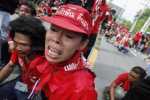
stores
Dymocks, IFC Mall
& other HK Dymocks
(some, probably, maybe)
online
Hong Kong & worldwide
USA & worldwide
UK
Canada
Germany
Japan
France